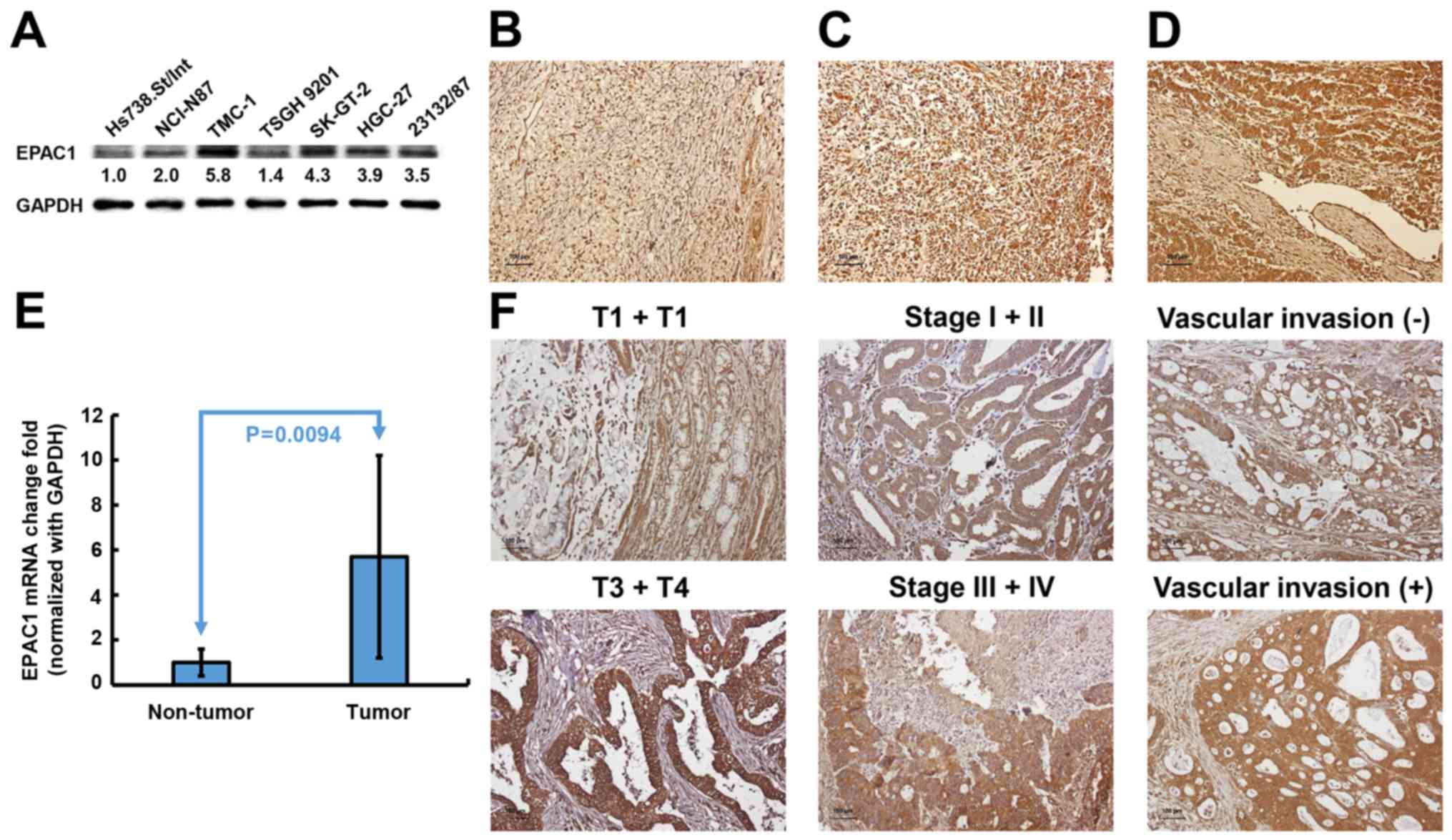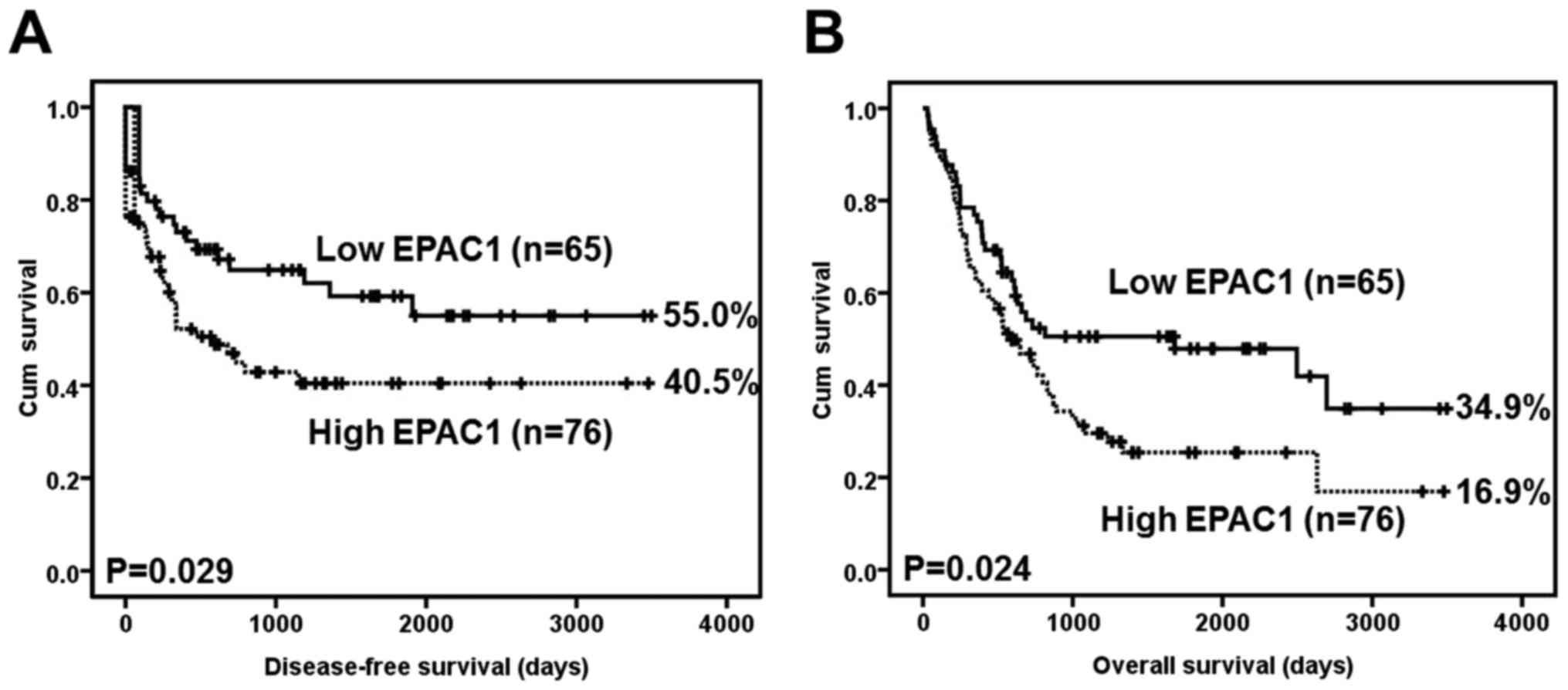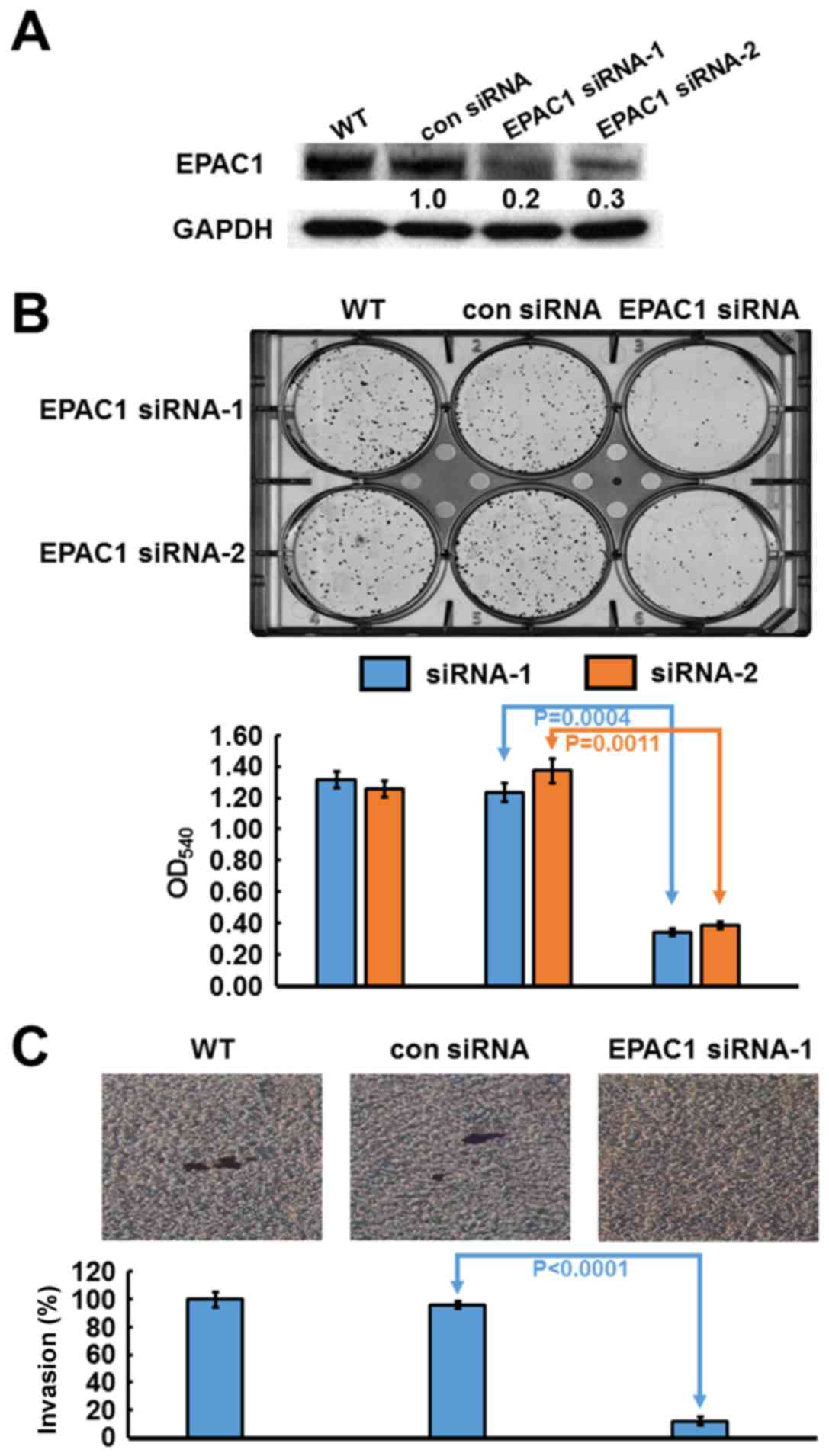|
1
|
Torre LA, Bray F, Siegel RL, Ferlay J,
Lortet-Tieulent J and Jemal A: Global cancer statistics, 2012. CA
Cancer J Clin. 65:87–108. 2015. View Article : Google Scholar : PubMed/NCBI
|
|
2
|
Fuchs CS and Mayer RJ: Gastric carcinoma.
N Engl J Med. 333:32–41. 1995. View Article : Google Scholar : PubMed/NCBI
|
|
3
|
Hartgrink HH, Jansen EPM, van Grieken NCT
and van de Velde CJ: Gastric cancer. Lancet. 374:477–490. 2009.
View Article : Google Scholar : PubMed/NCBI
|
|
4
|
Vogiatzi P, Vindigni C, Roviello F,
Renieri A and Giordano A: Deciphering the underlying genetic and
epigenetic events leading to gastric carcinogenesis. J Cell
Physiol. 211:287–295. 2007. View Article : Google Scholar : PubMed/NCBI
|
|
5
|
Lin KY, Fang CL, Chen Y, Li CF, Chen SH,
Kuo CY, Tai C and Uen YH: Overexpression of nuclear protein kinase
CK2 β subunit and prognosis in human gastric carcinoma. Ann Surg
Oncol. 17:1695–1702. 2010. View Article : Google Scholar : PubMed/NCBI
|
|
6
|
Lin KY, Wang LH, Hseu YC, Fang CL, Yang
HL, Kumar KJS, Tai C and Uen YH: Clinical significance of increased
guanine nucleotide exchange factor Vav3 expression in human gastric
cancer. Mol Cancer Res. 10:750–759. 2012. View Article : Google Scholar : PubMed/NCBI
|
|
7
|
Fang CL, Hseu YC, Lin YF, Hung ST, Tai C,
Uen YH and Lin KY: Clinical and prognostic association of
transcription factor SOX4 in gastric cancer. PLoS One.
7:e528042012. View Article : Google Scholar : PubMed/NCBI
|
|
8
|
Wang XT, Kong FB, Mai W, Li L and Pang LM:
MUC1 immunohistochemical expression as a prognostic factor in
gastric cancer: Meta-analysis. Dis Markers. 2016:94215712016.
View Article : Google Scholar : PubMed/NCBI
|
|
9
|
Ren C, Chen H, Han C, Fu D, Wang F, Wang
D, Ma L, Zhou L and Han D: The anti-apoptotic and prognostic value
of fibroblast growth factor 9 in gastric cancer. Oncotarget.
7:36655–36665. 2016.PubMed/NCBI
|
|
10
|
Burdyga A, Conant A, Haynes L, Zhang J,
Jalink K, Sutton R, Neoptolemos J, Costello E and Tepikin A: cAMP
inhibits migration, ruffling and paxillin accumulation in focal
adhesions of pancreatic ductal adenocarcinoma cells: Effects of PKA
and EPAC. Biochim Biophys Acta. 1833:2664–2672. 2013. View Article : Google Scholar : PubMed/NCBI
|
|
11
|
Cheng X, Ji Z, Tsalkova T and Mei F: Epac
and PKA: A tale of two intracellular cAMP receptors. Acta Biochim
Biophys Sin (Shanghai). 40:651–662. 2008. View Article : Google Scholar : PubMed/NCBI
|
|
12
|
Bos JL: Epac proteins: Multi-purpose cAMP
targets. Trends Biochem Sci. 31:680–686. 2006. View Article : Google Scholar : PubMed/NCBI
|
|
13
|
Grandoch M, Rose A, ter Braak M,
Jendrossek V, Rübben H, Fischer JW, Schmidt M and Weber AA: Epac
inhibits migration and proliferation of human prostate carcinoma
cells. Br J Cancer. 101:2038–2042. 2009. View Article : Google Scholar : PubMed/NCBI
|
|
14
|
Lorenz R, Aleksic T, Wagner M, Adler G and
Weber CK: The cAMP/Epac1/Rap1 pathway in pancreatic carcinoma.
Pancreas. 37:102–103. 2008. View Article : Google Scholar : PubMed/NCBI
|
|
15
|
Baljinnyam E, De Lorenzo MS, Xie LH,
Iwatsubo M, Chen S, Goydos JS, Nowycky MC and Iwatsubo K: Exchange
protein directly activated by cyclic AMP increases melanoma cell
migration by a Ca2+-dependent mechanism. Cancer Res.
70:5607–5617. 2010. View Article : Google Scholar : PubMed/NCBI
|
|
16
|
Baljinnyam E, Umemura M, De Lorenzo MS,
Iwatsubo M, Chen S, Goydos JS and Iwatsubo K: Epac1 promotes
melanoma metastasis via modification of heparan sulfate. Pigment
Cell Melanoma Res. 24:680–687. 2011. View Article : Google Scholar : PubMed/NCBI
|
|
17
|
Baljinnyam E, Umemura M, Chuang C, De
Lorenzo MS, Iwatsubo M, Chen S, Goydos JS, Ishikawa Y, Whitelock JM
and Iwatsubo K: Epac1 increases migration of endothelial cells and
melanoma cells via FGF2-mediated paracrine signaling. Pigment Cell
Melanoma Res. 27:611–620. 2014. View Article : Google Scholar : PubMed/NCBI
|
|
18
|
Misra UK and Pizzo SV: Epac1-induced
cellular proliferation in prostate cancer cells is mediated by
B-Raf/ERK and mTOR signaling cascades. J Cell Biochem.
108:998–1011. 2009. View Article : Google Scholar : PubMed/NCBI
|
|
19
|
Misra UK and Pizzo SV: Upregulation of
mTORC2 activation by the selective agonist of EPAC, 8-CPT-2Me-cAMP,
in prostate cancer cells: Assembly of a multiprotein signaling
complex. J Cell Biochem. 113:1488–1500. 2012.PubMed/NCBI
|
|
20
|
Menon J, Doebele RC, Gomes S, Bevilacqua
E, Reindl KM and Rosner MR: A novel interplay between Rap1 and PKA
regulates induction of angiogenesis in prostate cancer. PLoS One.
7:e498932012. View Article : Google Scholar : PubMed/NCBI
|
|
21
|
Rangarajan S, Enserink JM, Kuiperij HB, de
Rooij J, Price LS, Schwede F and Bos JL: Cyclic AMP induces
integrin-mediated cell adhesion through Epac and Rap1 upon
stimulation of the beta 2-adrenergic receptor. J Cell Biol.
160:487–493. 2003. View Article : Google Scholar : PubMed/NCBI
|
|
22
|
Bastian P, Balcarek A, Altanis C, Strell
C, Niggemann B, Zaenker KS and Entschladen F: The inhibitory effect
of norepinephrine on the migration of ES-2 ovarian carcinoma cells
involves a Rap1-dependent pathway. Cancer Lett. 274:218–224. 2009.
View Article : Google Scholar : PubMed/NCBI
|
|
23
|
Uen YH, Fang CL, Hseu YC, Shen PC, Yang
HL, Wen KS, Hung ST, Wang LH and Lin KY: VAV3 oncogene expression
in colorectal cancer: Clinical aspects and functional
characterization. Sci Rep. 5:93602015. View Article : Google Scholar : PubMed/NCBI
|
|
24
|
Oliveira FJ, Ferrão H, Furtado E, Batista
H and Conceição L: Early gastric cancer: Report of 58 cases.
Gastric Cancer. 1:51–56. 1998. View Article : Google Scholar : PubMed/NCBI
|
|
25
|
de Rooij J, Zwartkruis FJ, Verheijen MH,
Cool RH, Nijman SM, Wittinghofer A and Bos JL: Epac is a Rap1
guanine-nucleotide-exchange factor directly activated by cyclic
AMP. Nature. 396:474–477. 1998. View
Article : Google Scholar : PubMed/NCBI
|
|
26
|
Kawasaki H, Springett GM, Mochizuki N,
Toki S, Nakaya M, Matsuda M, Housman DE and Graybiel AM: A family
of cAMP-bindinG proteins that directly activate Rap1. Science.
282:2275–2279. 1998. View Article : Google Scholar : PubMed/NCBI
|
|
27
|
Abate-Shen C and Shen MM: Molecular
genetics of prostate cancer. Genes Dev. 14:2410–2434. 2000.
View Article : Google Scholar : PubMed/NCBI
|
|
28
|
Hao F, Tan M, Xu X, Han J, Miller DD,
Tigyi G and Cui MZ: Lysophosphatidic acid induces prostate cancer
PC3 cell migration via activation of LPA(1), p42 and p38alpha.
Biochim Biophys Acta. 1771:883–892. 2007. View Article : Google Scholar : PubMed/NCBI
|
|
29
|
Caswell PT and Norman JC: Integrin
trafficking and the control of cell migration. Traffic. 7:14–21.
2006. View Article : Google Scholar : PubMed/NCBI
|
|
30
|
Almahariq M, Chao C, Mei FC, Hellmich MR,
Patrikeev I, Motamedi M and Cheng X: Pharmacological inhibition and
genetic knockdown of exchange protein directly activated by cAMP 1
reduce pancreatic cancer metastasis in vivo. Mol Pharmacol.
87:142–149. 2015. View Article : Google Scholar : PubMed/NCBI
|
|
31
|
Almahariq M, Tsalkova T, Mei FC, Chen H,
Zhou J, Sastry SK, Schwede F and Cheng X: A novel EPAC-specific
inhibitor suppresses pancreatic cancer cell migration and invasion.
Mol Pharmacol. 83:122–128. 2013. View Article : Google Scholar : PubMed/NCBI
|
|
32
|
Baljinnyam E, Umemura M, De Lorenzo MS,
Xie LH, Nowycky M, Iwatsubo M, Chen S, Goydos JS and Iwatsubo K:
Gβγ subunits inhibit Epac-induced melanoma cell migration. BMC
Cancer. 11:2562011. View Article : Google Scholar : PubMed/NCBI
|

















